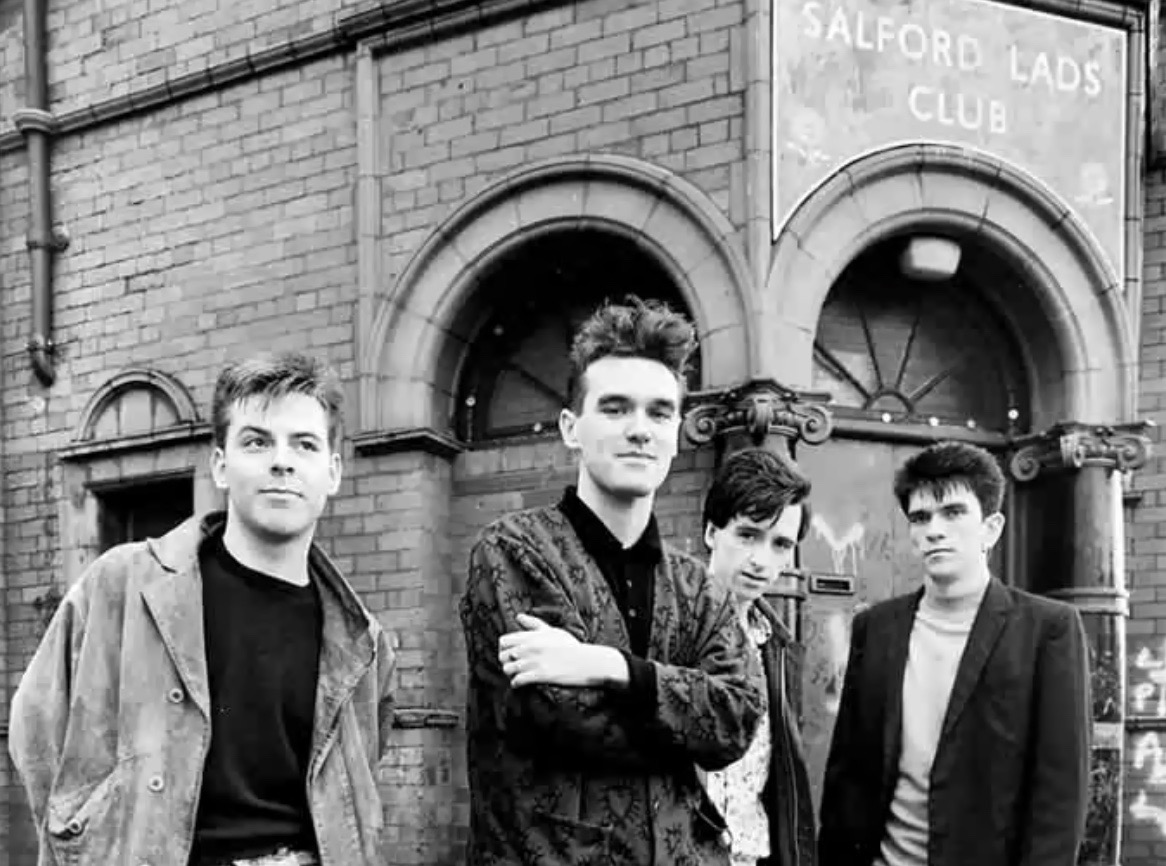
The Smiths: ‘A Light That Never Goes Out’
“It’s time the tale were told of how you took a child and you made him old.”
I’m not sure exactly when or where I first heard the Smiths, but it was probably 1985 during my freshman year at Ridgeway High School in Memphis.
Someone—I can’t remember who—told me I needed to check out this band, and then they hit “play” on the tape deck. Out came “Reel Around the Fountain,” the first track of the band’s debut album.
While the details of my initial encounter with the Smiths are fuzzy, their sound was indelible. In that instant, I knew life could never be sane again.
In the Smiths, I found a band that was my own. A band that kept getting better with each song of theirs I heard. A band that differed from the bubblegum pop and glam rock of the time. A band whose music said something to me about my life.
For those unfamiliar, the Smiths are the short-lived but widely influential British group that broke onto the music scene in the early 1980s before splitting a few years later at the height of their popularity. They captured the spirit of ’80s angst and alienation, and they remain beloved to this day by many, including yours truly.
How a suburban middle-class kid from Memphis came to connect deeply with an indie rock quartet from Manchester whose music most people thought appealed only to outcasts and misfits might seem like a mystery. To me, it was anything but.
My latest blog explores why the Smiths’ music was so pivotal and why I remain a devout fan all these years later.
‘Passions just like mine’
First, please know my fanaticism had nothing to do with our shared name, though I’m sure some classmates thought, “Obviously, Smith would like a band called the Smiths.” But I became a diehard for other reasons: Morrissey’s poetic lyrics, Johnny Marr’s distinctive guitar riffs, Andy Rourke’s and Mike Joyce’s perfect rhythm, and the band’s overwhelming English aesthetic.
They released only 73 songs over four studio albums and some compilations (click here for Rolling Stone’s mostly accurate ranking of the Smiths’ canon). With each tape I bought and each song I heard, I fell deeper into their world.
I fell because the Smiths’ sound was pure, and their songwriting was poetic. Musically, they boasted the indisputable talents of Marr, Rourke, and Joyce. And lyrically, they had one of the greatest songwriter-poets of that generation. I know Morrissey isn’t everyone’s cup of tea, and that many indeed loathe him, but his moody, melancholy lyrics struck a chord with me. That’s what mattered.
For one, he was the first artist I encountered who made literary references in his songs. Morrissey mentioned Shakespeare, Keats, Yeats, and Wilde—the latter three on one track, “Cemetry Gates”—and included less apparent references to writers like Jack Kerouac, George Eliot, and Virginia Woolf.
That bookish sensibility wasn’t the only draw. A sly humor infused Morrissey’s writing, yet he was equally sad and sardonic. He also had a unique ability to speak to and for the disaffected and downtrodden. I devoured it all.
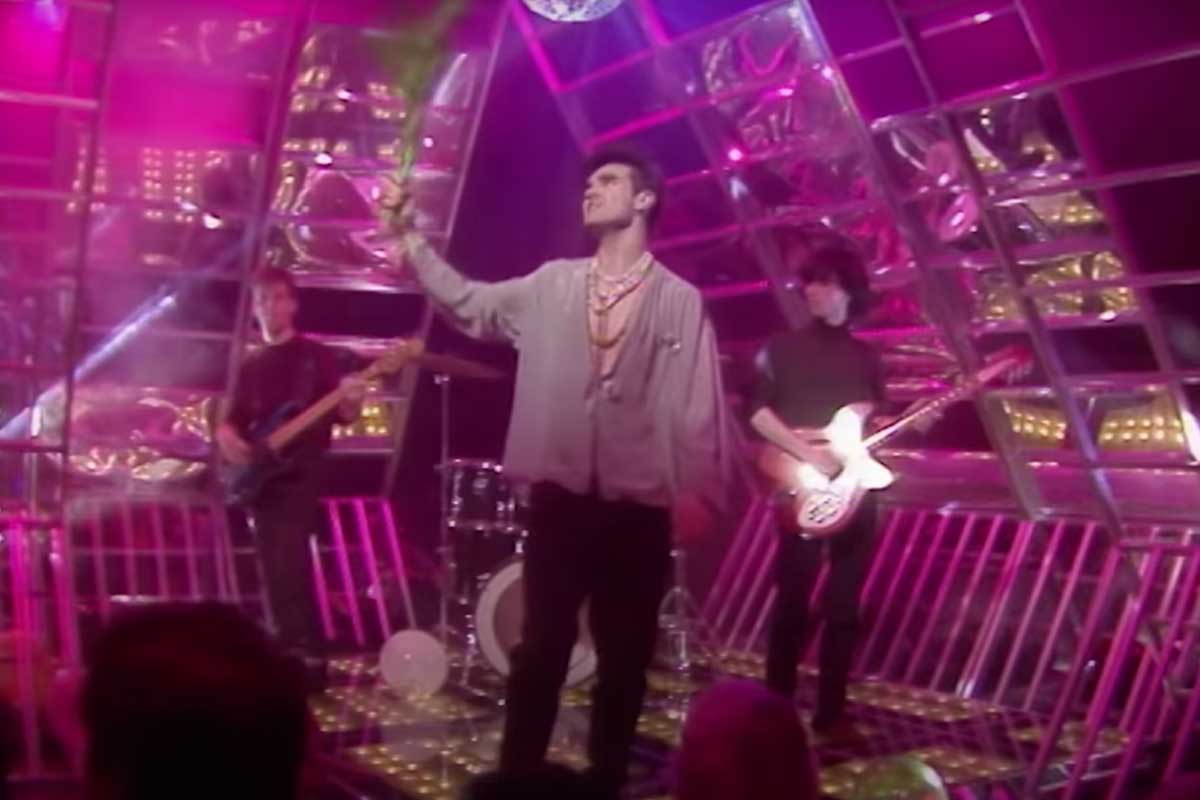
The Smiths were notably political, albeit with an intellectual approach. They savaged British institutions like the monarchy (“The Queen is Dead”), the church (“Vicar in a Tutu”), the education system (“Headmaster Ritual”), the food industry (“Meat is Murder”), and even the music business (“Paint a Vulgar Picture”). It was less “fight the power” and more “satirize the power with well-versed, cheeky criticisms.”
The Smiths could produce absolute bangers (e.g., “Handsome Devil” and “Sweet and Tender Hooligan”) and mopey ballads (e.g., “I Know It’s Over” and “Please Please Please Let Me Get What I Want”) with equal success. And they had several enormous hits (e.g., “How Soon is Now?” and “Panic”) now revered by a new legion of followers.
Their music resonates far and wide, and they are one of the most critically acclaimed bands of the last 40 years. Even though they broke up way too soon and gave the world only a glimpse into their genius without fully living up to their potential, the music they released decades ago remains fresh. That can’t be said of most artists.
‘Sixteen, clumsy, and shy’
While the Smiths had something for everyone, their fandom was (and still is) reduced to a stereotype—depressed, antisocial loners who wear black. But devotees of the Smiths are not a monolith.
Though I was never the stereotypical Smiths fanatic, however, by 1987—the year the band broke up and just two years after I got hooked—I was the embodiment of “sixteen, clumsy and shy,” a perfect line from a perfect song, “Half a Person.” What teenager didn’t feel that way, at least sometimes?
People are surprised when they discover how much I like the Smiths. But why I became and remain a fan makes sense—to me and the handful of friends who shared a love for their music, anyway.
The Smiths helped fans deal with that clumsiness and shyness. They assured us it was OK if strange fears gripped us. They provided comfort and company in the face of a cold and calculating world. So, I bought all their tapes, plastered my room with posters, and memorized the lyrics.
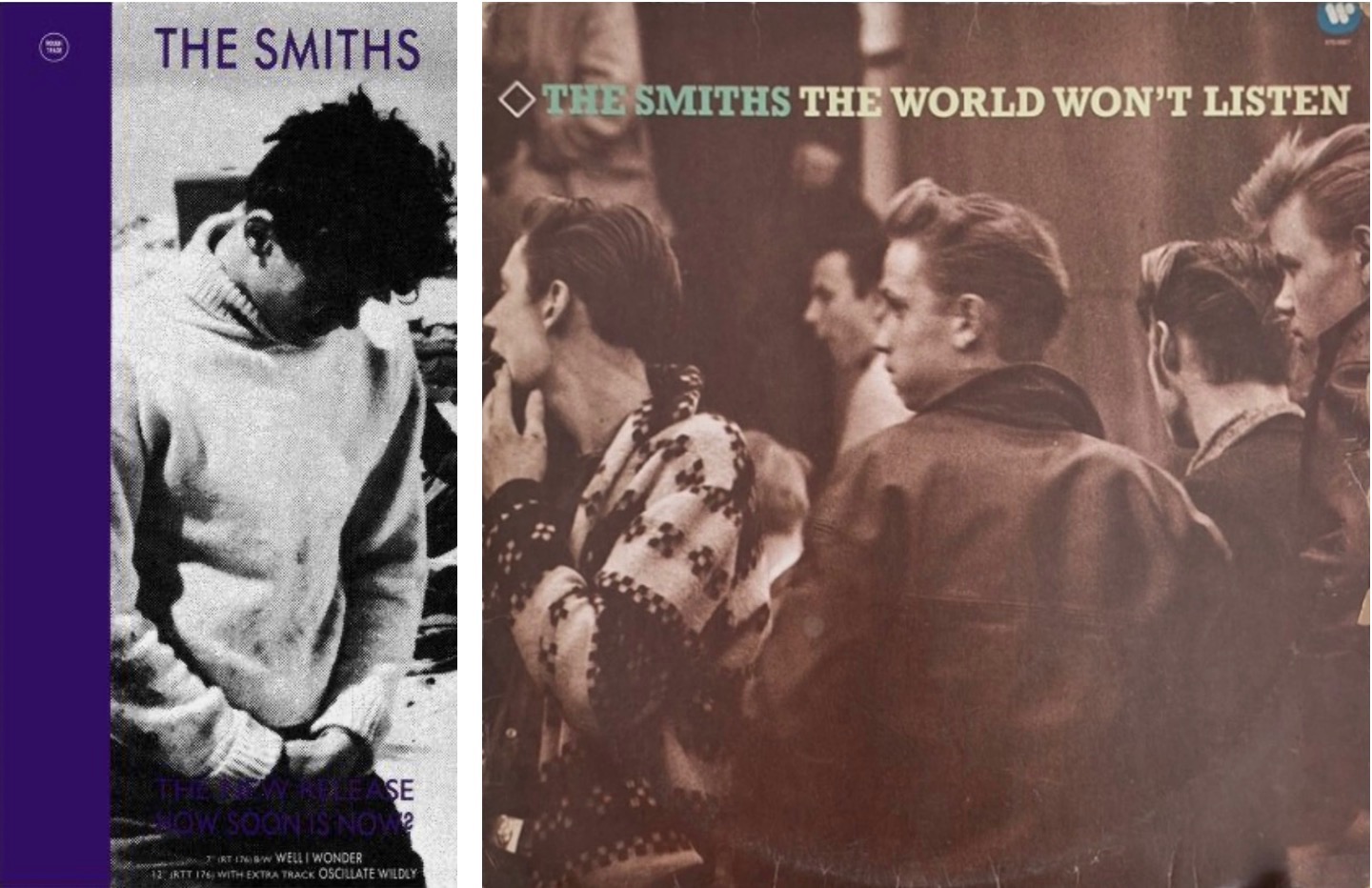
Those lyrics endeared me to the Smiths even more than Marr’s brilliant arrangements. However, my appreciation for Marr’s distinct guitar style has grown over time. The same is true of Rourke’s bass playing; when he died a few years ago, Rolling Stone said he was the “most underrated element in the Smiths’ sound.” I couldn’t agree more, even if the Morrissey/Marr duo tag got the credit and attention.
Morrissey’s songwriting appealed to me as someone trying to find himself but also as an aspiring writer. His lyrics spoke of loneliness and longing, defiance and defeat. He wrote extensively about disillusionment—with himself, others, and society—but did so in a self-deprecating and droll manner.
I plan to rank the best Smiths songs at some point (the links I’ve included in this post offer clues), but for this blog, I’ve listed below 12 of my favorite Morrissey lyrics. I picked these randomly based on whatever song was playing in the background as I wrote. Ask me again next week, and I might pick 12 different ones.
The Smiths quotes
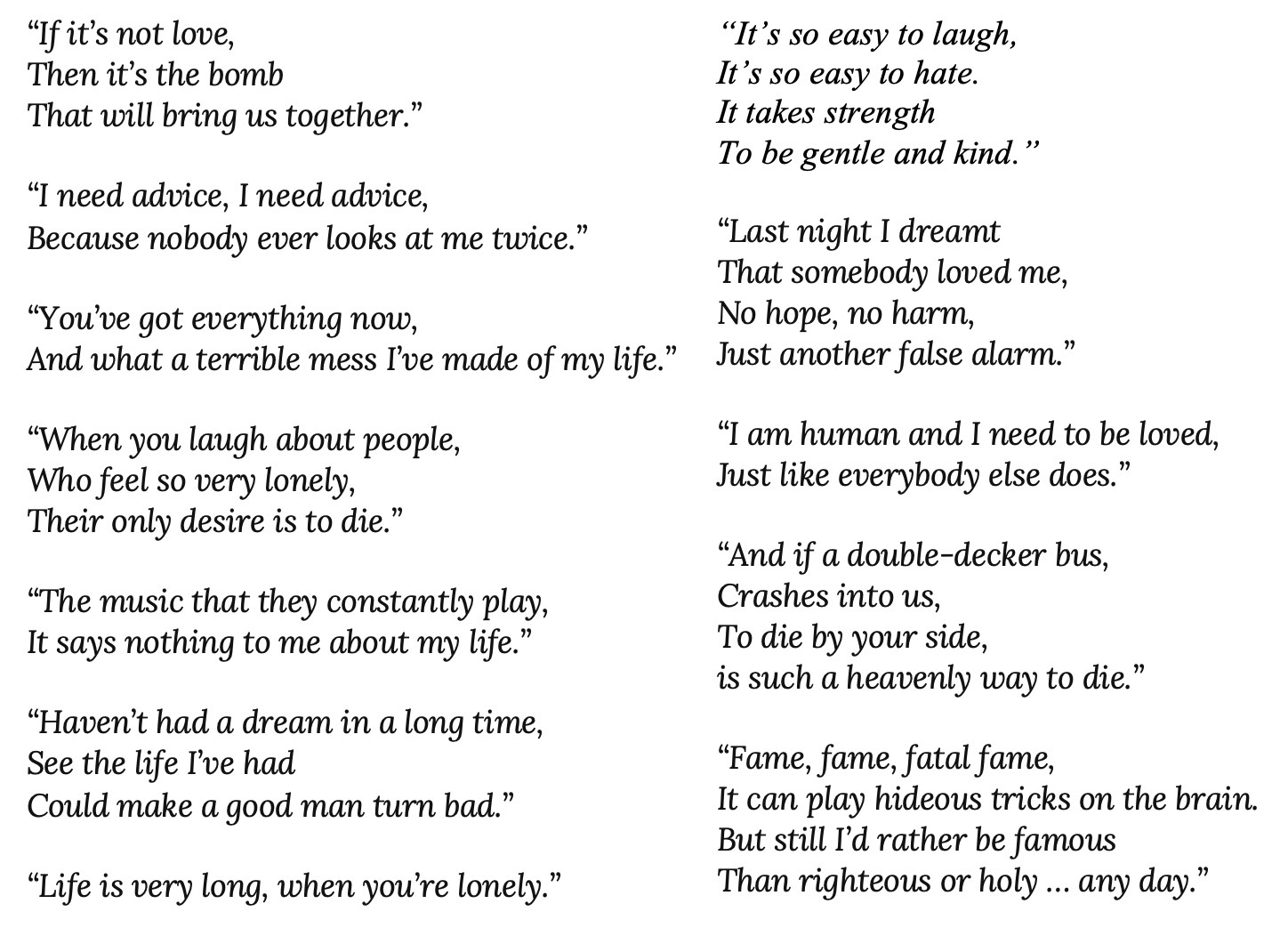
That last one—the “fame, fame, fatal fame” line—is from the song “Frankly, Mr. Shankly.” That verse made it into the Ridgeway 1989 yearbook as my official senior quote.
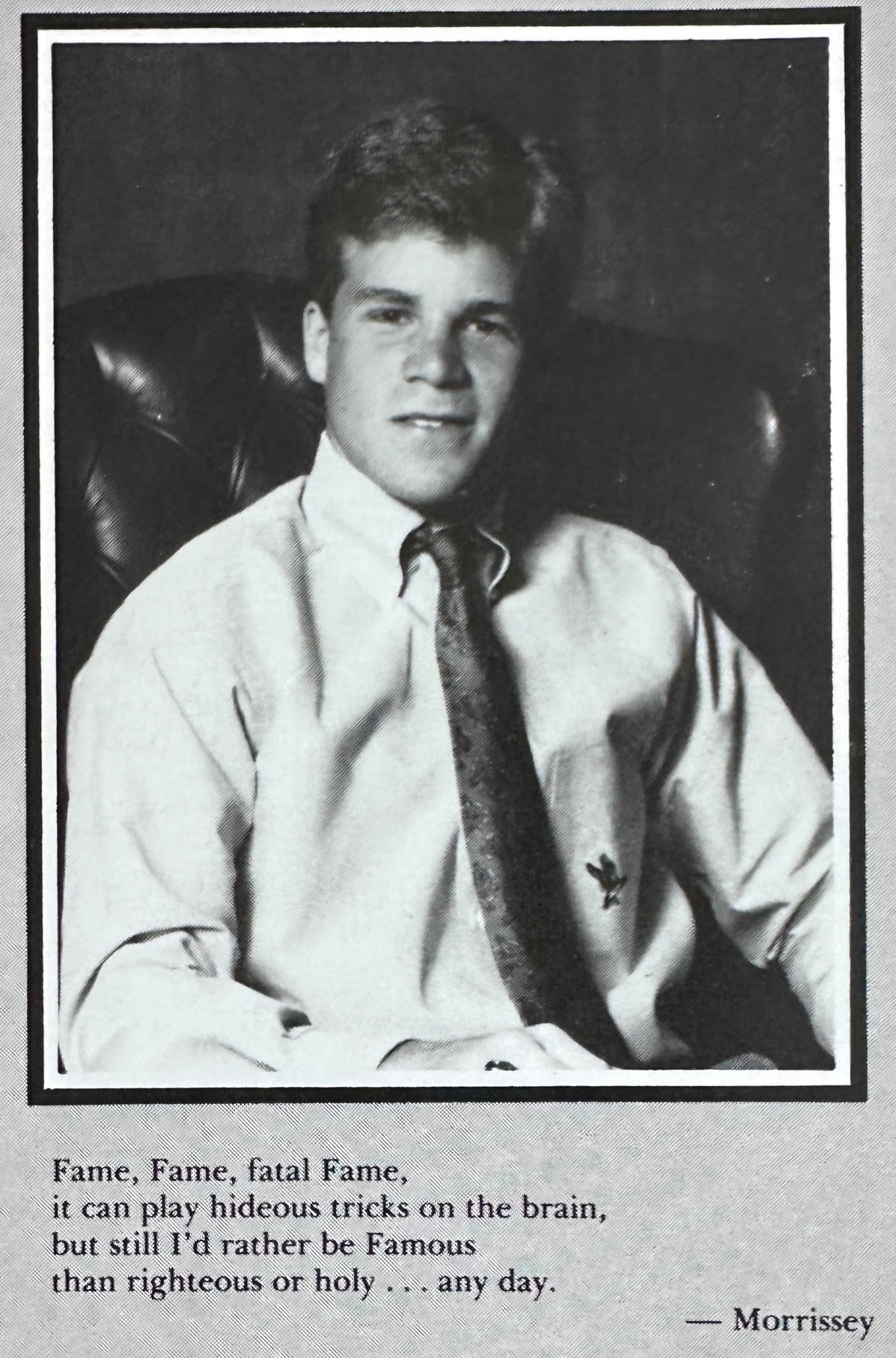
Classmates selected more traditional, inspirational passages from long-dead presidents and other notable dignitaries; I was all-in on Morrissey—even if that quote no longer rings true.
‘Songs that saved your life’
After graduating high school, I carried my Smiths fanaticism to college, where I hung my posters of the band in my dorm room, including a giant “Queen is Dead” poster that was impossible to miss.
On move-in day, as parents were milling about the dorm before leaving us behind, the mother of one of my suite mates wandered into our room, glanced at that massive poster of THE SMITHS in front of the Salford Lads Club in Manchester, and was both delighted and stunned because she thought it was an enlarged family photo.
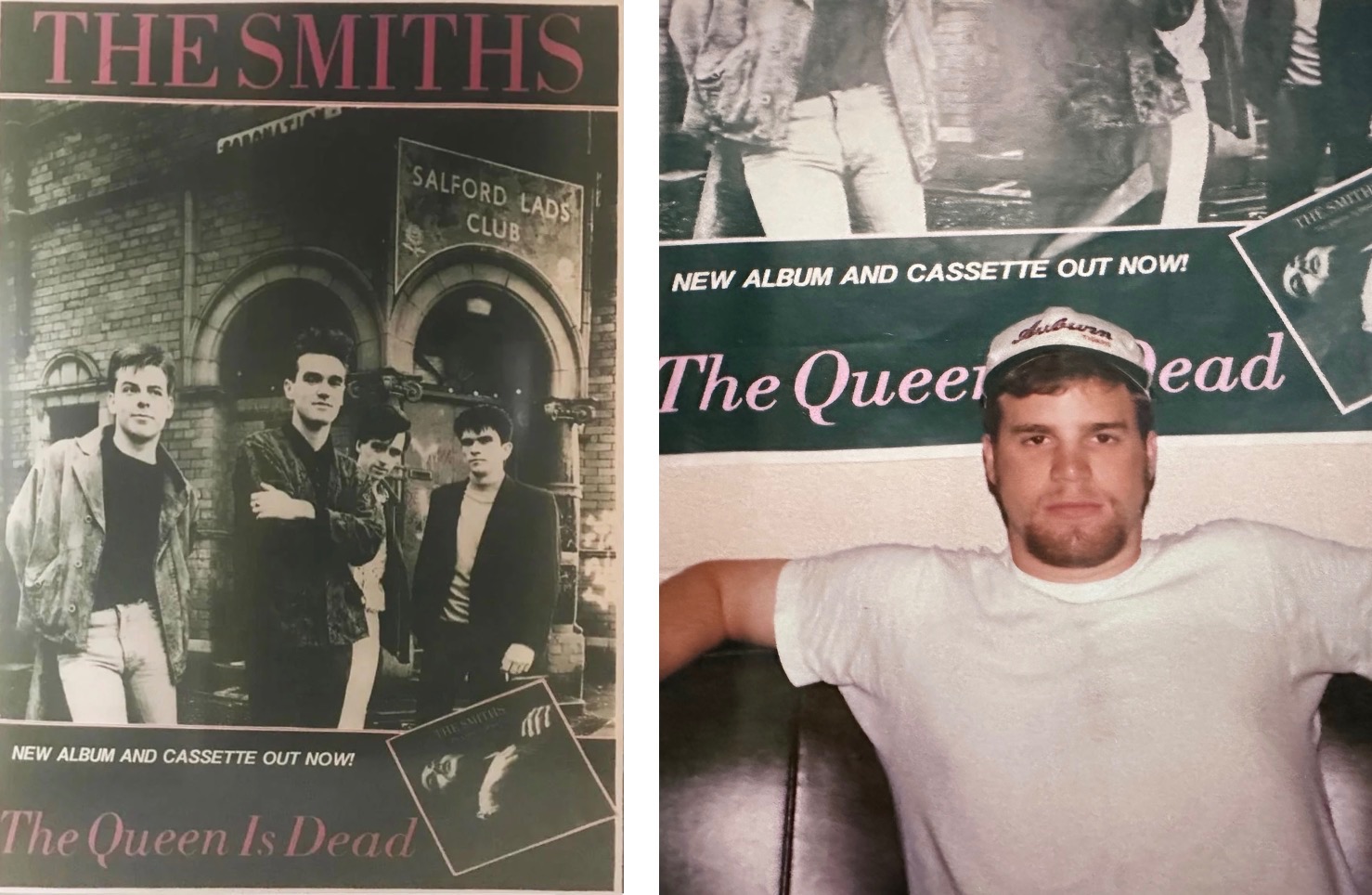
I chuckled and said, “No, that’s a band called the Smiths.” It took her a second to comprehend it wasn’t a picture of the Smith family standing next to her in the room but some rock group she had never heard of.
Though I never saw the Smiths live—they didn’t play many concerts in the U.S. during their four-year run and broke up when I was 16—I did see a Morrissey solo show in Sacramento in 1991 when I worked in Yosemite National Park.
That adventure involved borrowing a friend’s truck and almost wrecking it since I didn’t know how to drive a stick shift (I lied and said I did), and the route involved several mountain passes. I somehow made it to the Cal Expo Amphitheater, where I bought a ticket, got some merch, and stood alone in awe watching one of my musical heroes in concert.
Was it as good as it must have been seeing Morrissey and the Smiths in their heyday, perhaps in a dark Manchester club when they were debuting something like “Panic”? Not at all, but being a fan means doing what you can—i.e., buying the ticket and taking the god damned ride—whenever you can because you might not get that chance again.
‘Is it really so strange?’
Over the years that followed, my musical tastes expanded. The Smiths and Morrissey suddenly shared airtime on my stereo with newfound loves like Steely Dan, Grateful Dead, Leonard Cohen, and Nick Cave & the Bad Seeds. I later found Morrissey’s politics and other antics a turnoff and stopped buying his newer records (though his solo debut, “Viva Hate,” is a fucking masterpiece).
Still, I remain a diehard fan of the Smiths, who became the first artists added to my musical Mount Rushmore. I follow and interact with them on social media, and I was giddy when a comment I made on the band’s official Facebook page went viral and received 1,400 reactions. Fans will get my joke:
The Smiths left a solid legacy, with many accolades to their credit and dozens of artists citing them as a significant influence. Their oeuvre is remarkable, considering how little time they spent together. Among their 73 recorded tracks, they released only a few subpar songs.
I named my Smiths/Morrissey playlist “Unlovable” after the second-to-last track on the standout compilation album, “Louder than Bombs.” That seemed like the perfect title primarily because the song contains what I believe is the quintessential Smiths’ lyric:
“I wear black on the outside,
’cause black is how I feel on the inside.
And if I seem a little strange,
well, that’s because I am.”
Nothing else sums it up quite so well. I celebrate the Smiths because they were the first band in my orbit who made it OK to feel strange. We’re all a little strange, so why not lean into it?
I can’t relate to all their lyrics the same way today I did as a teenager. But their music takes me back and allows me to celebrate the discovery of a once-in-a-generation band that continues to be part of my life’s soundtrack and whose songs are of a particular time yet somehow timeless.
That’s why I still listen to the Smiths. That’s why I’m forever a fan of a band who, against all odds, I fell in love with at age 14 and remain devoted to all these decades later.
And that’s why they are, to borrow the title from their best song, a “light that never goes out.”


Post a comment